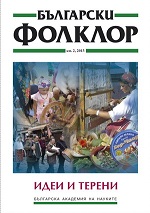„Фолклорната носталгия” или за терените на българската етнология и фолклористика
“Folklore Nostalgia” or on the Field Sites of the Bulgarian Ethnology and Folklore Studies
Author(s): Tsvetelina DimitrovaSubject(s): Anthropology
Published by: Институт за етнология и фолклористика с Етнографски музей при БАН
Keywords: folklore nostalgia; ethnology; field sites; Internet
Summary/Abstract: The author presents observations related to the concept “folklore nostalgia” or also defined as “structural nostalgia” of Michael Herzfeld as an aspect of an assumption of cultural intimacy defined by him and its application in the field sites of the Bulgarian ethnology and folklore studies. This relation has the purpose of opening the discussion about the question to what extent and direction this concept could be productively used in the anthropologically oriented in methodology disciplines, rather than formulating and deriving theoretical assumptions. The concept of cultural intimacy as well as the concepts of social poetics and structural/folklore nostalgia are related to the research domains of the local, the national and their interaction, the social and cultural spaces in which the official state and institutional discourse intersects (and comes in dialogue) with the discourse of personality and group. Applying the concept of social poetics in the attempts to capture and analyze the private space of a nation - that is the sphere of cultural intimacy could be fruitful/productive in studying the following: 1. Ethno space – the space of the mobile social groups – tourists, migrants (internal, external; emigrants, immigrants, re-emigrants) and the processes of reconstructing of social/cultural identities, images of the self and strategies for (auto) representation; 2. Media spaces and the images they offer as parts of reality or scenarios of other possible reality (Apaduraj); the commercial usage of the images of “tradition”, of the “our”, mostly in the sphere of advertising. The Internet has a special significance as a “new” field site and a source at the same time. The research on this “internal” sphere where the interpretation of the official discourse takes place (to the extent presented by the media) is extremely fascinating due to the specific type of communication similar in its features to the folklore communication.
Journal: Български фолклор
- Issue Year: XXXIX/2013
- Issue No: 2
- Page Range: 217-226
- Page Count: 10
- Language: Bulgarian
- Content File-PDF

